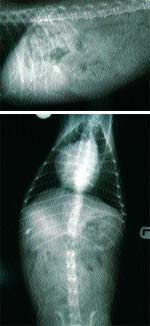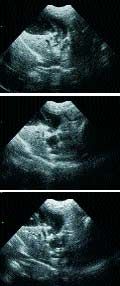Ultrasound important tool when diagnosing gall bladder disease; severe cases may rupture
Signalment: Canine, Cavalier King Charles Spaniel, 9.5 years old, male castrated, 15 lbs.
Signalment:
Canine, Cavalier King Charles Spaniel, 9.5 years old, male castrated, 15 lbs.

Photo 1 (top) and Photo 2 (bottom).
Clinical history:
The dog is presented for icterus and not eating. The dog has a history of diabetes mellitus, hyperadrenocorticism, heart failure, gallstones, renoliths and cataracts. Therapy has included intravenous fluids, Baytril, amoxicillin, insulin, Denosyl SD4, Lotensin, Lysodren and eye medications.
Physical examination:
The findings include rectal temperature 101.4° F, heart rate 118/min, icteric mucous membranes, and normal capillary refill time. There is a grade 5/6 systolic heart murmur and normal lung sounds heard. The abdomen is nonpainful.
Laboratory results:
A complete blood count, serum chemistry profile, and urinalysis were performed and are outlined in Table 1.
Radiograph examination:
The abdominal radiographs were performed.
My comments:
The abdominal radiographs show a calculus in the area of the gall bladder.
Ultrasound examination:
Thorough abdominal ultrasonography was performed.
My comments:
The liver shows a uniform echogenicity in its parenchyma except for mineralization in the right liver lobe. No masses noted within the liver parenchyma. The gall bladder is large, and its walls are not thickened or hyperechoic.

Photo 3 (top), Photo 4, and Photo 5.
The gall bladder does contain some moderate size calculi and there is blockage of the common bile duct with a calculus. The spleen shows a uniform echogenicity in its parenchyma - no masses noted. The left and right kidneys are similar in size, shape and echotexture. No masses or calculi were noted in either kidney. The urinary bladder is distended with urine and contains some urine sediment material - no masses or calculi noted. The stomach, small intestine and pancreatic region are normal.
Case management:
In this case, choleliths in the gall bladder and common bile duct and obstruction of the common bile duct from a lodged cholelith along with the many other medical problems is the clinical diagnosis. Surgical removal of the gall bladder is recommended.
Follow-up report:
The dog was taken to surgery the next morning after the abdominal ultrasound study was done. During surgery, the obstructing cholelith in the common bile duct was moved by external palpation to the duodenal opening. A simple enterotomy was then performed and the cholelith literally fell into the lumen of the duodenum. The dog made an uneventful recovery from the surgery. The dog's icterus resolved within one week after surgery.

Table 1: Results of laboratory tests.
Gall bladder disease
Because of routine abdominal ultrasonography, more dogs are now being diagnosed with acute and chronic gallbladder diseases (see Table 2). Cholecystitis often leads to vague signs of vomiting, fever and abdominal pain. The usual cause of cholecystitis is thought to be a bacterial infection from ascending bacteria from gastrointestinal tract or from hematogenous bacteria.
When cholecystitis becomes severe, gallbladder necrosis and rupture may occur, with subsequent biliary peritonitis. Ultrasonography identifies increased gallbladder wall thickness and echogenicity; dilated, tortuous bile ducts; and concurrent cholelithiasis.

Table 2: Bile acid/ultrasonographic findings associated with biliary tract disease.
Antimicrobial therapy based on bacterial culture and sensitivity test results is the optimal treatment for cholecystitis. Severe cases of cholecystitis, such as emphysematous or necrotic cholecystitis, may be treated surgically with cholecystectomy.
Choleliths are uncommon in older dogs as well. Choleliths are usually composed of cholesterol, bile acids, pigments, calcium and protein. Diet and cholecystitis are predisposing causes for cholelith formation.
The clinical signs and diagnostic approach to cholelithiasis are similar to that used for cholecystitis. Treatment of cholelithiasis may be either surgical or medical. Seldom is surgery needed because of the presence of choleliths; however, cholecystectomy can be performed for cholelithiasis, which will prevent recurrence.
Medical therapy may include antimicrobial agents and commercial canine diet formulated for liver disease.
Dr. Hoskins is owner of DocuTech Services in Baton Rouge, La. He can be reached at (225) 955-3252; fax, (214) 242-2200.